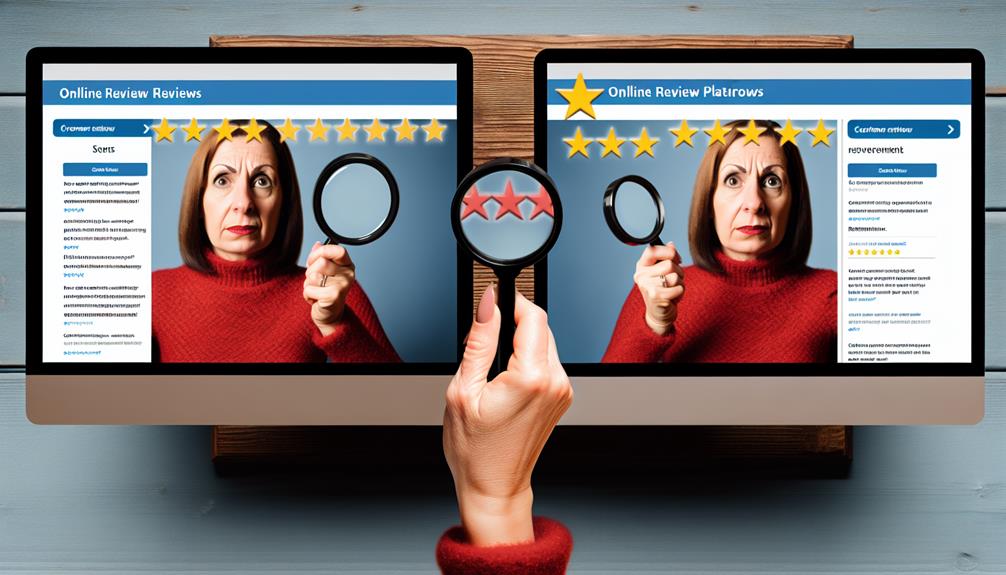In the digital age, online reviews have become a crucial source of information for consumers seeking the best products and services. When it comes to platforms like Yelp and Google, the question of trustworthiness often arises.
While both platforms offer a plethora of reviews, the reliability of these reviews can vary. Factors such as review authenticity, bias, and filtering mechanisms come into play.
Understanding which platform holds more credibility can significantly impact consumer decisions. So, which platform can truly be deemed more trustworthy, Yelp or Google?
Key Takeaways
- Yelp and Google both face trust challenges due to review manipulation concerns.
- Yelp emphasizes detailed reviews and community trust, while Google integrates reviews for quick access.
- Yelp is transparent with strict review filtering, while Google's reliance on user-generated content may lead to manipulation.
- Consider review authenticity, patterns of fake reviews, filtering mechanisms, and overall sentiment when comparing Yelp and Google.
Trustworthiness of Yelp Reviews

The reliability of Yelp reviews as a source of consumer feedback has been a subject of scrutiny and debate among researchers and consumers alike. One of the main concerns raised is the issue of review manipulation on the platform. Businesses have been known to engage in tactics such as paying for fake positive reviews or artificially boosting their ratings to attract more customers. Yelp has implemented algorithms and review filters to combat such practices, but the problem persists to some extent.
In comparison to its competitors, Yelp's approach to handling review manipulation has been more transparent. The platform actively warns users about businesses that have been caught engaging in such activities and takes measures to ensure the integrity of its reviews. This level of accountability sets Yelp apart from other review sites.
When it comes to competitor comparison, Yelp has positioned itself as a platform that values the authenticity of reviews. While no review site is completely immune to manipulation, Yelp's efforts to address this issue demonstrate a commitment to providing users with genuine and reliable feedback. By fostering a community where users can trust the reviews they read, Yelp continues to strive for increased trustworthiness in the realm of online consumer feedback.
Trustworthiness of Google Reviews
In the realm of online consumer feedback, the trustworthiness of Google Reviews has become a focal point of discussion among researchers and consumers alike. One of the key concerns surrounding Google Reviews is the issue of review manipulation. Businesses sometimes resort to unethical practices such as buying fake positive reviews or posting negative reviews for competitors to sway public opinion. This manipulation undermines the authenticity of the feedback, leading to a lack of trust in the overall rating system.
However, Google has implemented algorithms and systems to combat review manipulation. They use various techniques to detect and filter out fake reviews, ensuring a more authentic representation of customer experiences. Despite these efforts, some manipulated reviews may still slip through the cracks, highlighting an ongoing challenge in maintaining the credibility of Google Reviews.
On the flip side, genuine reviews on Google can provide valuable insights for potential customers. Authentic reviews help individuals make informed decisions about products or services, contributing to a more transparent marketplace. Users often look for specific details, personal anecdotes, and a mix of positive and negative feedback to gauge the credibility of reviews.
User Experience on Yelp Vs. Google

Comparing user experiences on Yelp and Google provides valuable insights into the differences in how consumers interact with and perceive online reviews platforms. The Yelp interface is known for its focus on user-generated content, with detailed reviews and ratings prominently displayed. On the other hand, Google's interface integrates reviews into its search results, making it more convenient for users to access information quickly.
To better understand the variations in user engagement between Yelp and Google, let's consider a comparison of their interfaces:
| Feature | Yelp Interface | Google Interface |
|---|---|---|
| Visual Appeal | Colorful layout with images and detailed reviews | Simple and clean design with quick access to info |
| User Interaction | Emphasis on community feedback and discussions | Integration with Google Maps and search algorithm |
| Review Authenticity | Detailed profiles and reviewer credibility | Verification processes and review filtering |
The Yelp interface tends to foster a sense of community and trust through detailed reviews and active user engagement. Conversely, Google's integration with its search algorithm and maps provides a seamless experience for users looking for quick information. Understanding how these platforms differ in user experience sheds light on how individuals perceive and interact with online reviews, ultimately influencing their trust in the information provided.
Business Practices and Policies Comparison
User engagement and interface design play crucial roles in shaping consumers' perceptions of online review platforms like Yelp and Google; delving into their business practices and policies provides further insights into how these platforms operate.
Business Practices and Policies Comparison:
- Review Manipulation and Bias:
Both Yelp and Google have faced allegations of review manipulation and bias. Yelp employs an algorithm that is designed to filter out fake reviews and highlight the most relevant ones. On the other hand, Google's review system relies heavily on user-generated content, which can sometimes be manipulated by businesses or competitors to skew ratings.
- Review Filtering and Authenticity:
Yelp is known for its strict review filtering system that aims to maintain the authenticity of reviews by screening out suspicious or fake ones. Google, while also implementing filters, may struggle to maintain the same level of review authenticity due to the sheer volume of reviews submitted daily.
- Transparency in Policies:
Yelp tends to be more transparent in its review policies, making it clear how reviews are filtered and what actions businesses can take if they believe a review is unfair. Google, although improving in this aspect, still lacks the same level of transparency regarding its review filtering processes, leaving some users and businesses questioning the authenticity of the reviews displayed.
Tips for Using Yelp and Google Wisely

For consumers seeking to navigate the online review landscape effectively, understanding strategic tips for utilizing Yelp and Google can enhance their decision-making process. When using Yelp and Google, one crucial aspect to consider is review authenticity. Both platforms have mechanisms in place to detect and filter out fake reviews, but it's still essential to look for patterns like overly positive or negative reviews that seem unnatural. Genuine reviews often provide detailed accounts of personal experiences, helping you gauge the credibility of the feedback.
Another tip for wisely using Yelp and Google is understanding review filtering. Yelp, for instance, uses an algorithm to filter out reviews that it deems unreliable, while Google allows users to see all reviews unless they violate its policies. It's important to be aware of how each platform handles review filtering to ensure you're getting a comprehensive view of a business's reputation.
To make the most of Yelp and Google reviews, consider looking at the overall sentiment and consensus among reviewers rather than focusing on individual comments. Additionally, take note of how recent the reviews are, as a business's quality and service standards can change over time. By being mindful of review authenticity and filtering practices, consumers can make more informed decisions when using Yelp and Google for their research.
Frequently Asked Questions
How Do Yelp and Google Handle Fake Reviews and Fraudulent Activity on Their Platforms?
When examining how Yelp and Google address fake reviews and fraudulent activity on their platforms, it is crucial to consider their review moderation and user verification processes.
Both platforms employ mechanisms to detect and mitigate fake reviews, aiming to uphold review authenticity and user trust.
Are There Any Differences in the Demographics of Users Who Prefer Yelp Over Google or Vice Versa?
When exploring user preferences, demographics play a crucial role in shaping individuals' trust in online platforms. Understanding the differences in user demographics between those who favor Yelp and Google can shed light on their respective credibility.
How Do Yelp and Google Determine the Ranking of Businesses in Search Results?
Yelp and Google utilize complex ranking algorithms to determine the order of businesses in search results. User influence, such as reviews, ratings, and engagement, plays a significant role in this process.
While both platforms aim to provide relevant and trustworthy information to users, they differ in their ranking criteria and algorithms. Ensuring review authenticity and combating fake reviews are ongoing challenges faced by both Yelp and Google to maintain the credibility of their search results.
Do Yelp and Google Have Any Partnerships or Relationships With Businesses That Could Affect the Trustworthiness of Their Reviews?
When evaluating the trustworthiness of reviews on platforms like Yelp and Google, it is essential to consider the potential impact of business relationships on review authenticity.
Both platforms have policies in place to address conflicts of interest and ensure transparency.
Understanding how these partnerships are managed can provide insights into the credibility of reviews and the overall trustworthiness of the platforms.
Are There Any Legal Implications for Businesses That Try to Manipulate Their Reviews on Yelp or Google?
Businesses that engage in review manipulation by posting fake reviews on platforms like Yelp or Google may face legal ramifications. Such actions can lead to consequences for the business, including damage to their reputation and potential legal actions for false advertising or deceptive practices.
It is essential for businesses to maintain integrity in their online presence to avoid these legal and reputational risks associated with manipulating reviews.
Conclusion
In conclusion, both Yelp and Google have their strengths and weaknesses when it comes to trustworthiness and user experience. While Yelp may have a more stringent review filtering process, Google provides a larger user base and more diverse range of reviews. Ultimately, it is important for consumers to use both platforms wisely and consider a variety of factors when making decisions based on online reviews.
Just like a chef uses a variety of spices to create a well-balanced dish, consumers should use multiple sources to make informed choices.

